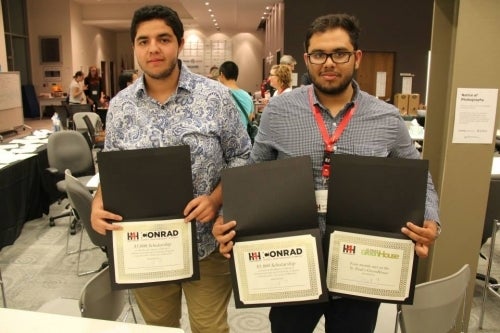Bedsores are the number one hospital-induced illness, and affect more than three million people in North America, with an average annual cost of approximately $40,000 per patient to treat. It is an illness that affects vulnerable segments of our population: More than 90 percent of patients over the age of 65 with Alzheimer’s or dementia have bedsores.
That's the social problem that Zied Etleb wants to solve. He and his friend and business partner, fellow fourth-year Honours Science student Moazam Khan, participated in last fall’s Hack4Health, organized by the Faculty of Applied Health Sciences and MAREP (Murray Alzheimer Research and Education Program), at UWaterloo. They talked with patients with dementia and multiple sclerosis, and learned that there were only limited solutions available to the common, well-known, and painful problem of bedsores.
They developed a prototype design for an adjustable compression mattress for the prevention of bedsores, a mattress that could also communicate real-time data to healthcare providers, with constant updates on a patient’s health and wellbeing.
After the hackathon, they decided to form a research team, consisting of Biomedical Science student Basil Ahmad and Mechanical Engineering student Huzaifa Khan to further investigate the problem and to better develop solutions.
The challenge for the team as they developed their solution was isolation. Zied came to St. Paul's GreenHouse in an effort to help develop their business, which is called Curiato (a blend of the Latin words for curiosity and innovation). “When our team was formed, we all had the same objective to address this issue, but we didn’t know much about the idea of building a social impact business.
GreenHouse taught us how to focus on the user, to build a customer-focused culture and a social-value business model.
In addition, Zied and Moazam highly appreciate the mentorship from Conrad professors David Rose and Marc Hurwitz in developing business and leadership strategies.

Zied Etleb and Moazam Khan
Zied also notes that a challenge had been getting momentum going on a project while still studying full time, but at GreenHouse, “the issue is keeping up with the momentum of others.”
He appreciates the motivation of being in community with like-minded students, and the mentorship of GreenHouse leaders who have helped his team take down barriers by creating connections with people.
He also appreciates having been granted one of the People and Wellbeing Fellowships at GreenHouse’s Big Ideas Challenge, providing an extra term at GreenHouse this past summer, helping Curiato as they further develop their products.
Over the next year, after graduation, the team plans to develop a patient information web portal to educate people about the prevention and treatment of bedsores, as well as information about available solutions, developments in the field, detection and more.
They are establishing key partnerships with faculty members in Applied Health Sciences and Science, healthcare institutions, retirement homes, applied health faculty and manufacturers, as well as surveying patients and experts to inform their design. The team has already secured expressions of interest for testing their mattress at both the Toronto Grace Hospital and at a Revera long-term care facility. They hope to have a prototype compression mattress ready for testing by March 2017.
Post-graduation, Zied and Moazam will be joining the MBET (Master in Business, Entrepreneurship and Technology) program at the Conrad Centre to expand their entrepreneurship knowledge and refine a strategy in time for prototype completion. They have also moved into Velocity Jungle, and GreenHouse has awarded some $4,500 for Curiato to develop the product. The team also recently won $5,000 for the Norman Esch Enterprise Co-op Award and completed a pitch for the $25,000 Velocity Fund finals in July.
“It comes down to your own work ethic – how much you’re willing to work on your idea.” For Zied and Moazam, both of whom have family members who have suffered bedsores as part of illness or recovery from surgery, they are willing to work hard and appreciate the help of others who help make their efforts succeed.
Zied's story is just one of many that reflect the type of passionate students that St. Paul's and the GreenHouse program attract. We are raising $500,000 through the Shape the World Campaign to expand our facilities and programming to ensure the success of these and future students.
To lend your support please visit: http://uwaterloo.ca/stpauls/give








